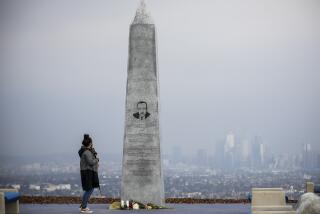Honoring the Earth as Well as the Lord
- Share via
RESEDA — Being ecologically correct isn’t easy for religious congregations. Few know that better than a clergyman assigned to environmental issues who organized a seminar recently on religion and commuting dilemmas.
“I think the church, synagogue or mosque, in order to claim its moral base as a place of caring for God’s creation, is going to have to make a real effort toward voluntary simplicity,” said the Rev. Peter Moore-Kochlas, director of Environmental Ministries, based in Reseda.
Yet, mega-churches and large synagogues draw congregants in gasoline-burning cars from great distances. Even so-called neighborhood churches draw loyal members from afar, adding to air pollution in Southern California. Going to work, the same people are more likely to drive than take alternate transportation.
Two individual exceptions--a well-known actor and a Protestant minister--spoke this week at Moore-Kochlas’ transportation seminar, one in a series of interfaith meetings on ecology.
Actor Ed Begley Jr., known for his environmental activism, took a bus to the seminar at Reseda United Methodist Church. “This 90-cent token,” said Begley, holding up the gold-colored piece before about 60 people, “helps people save a lot of money.”
In addition, Begley said he rides his bicycle up to 40 or 50 miles a day when he has meetings. He recently replaced his solar-electric automobile, which he used for five years, for a used Volkswagen Cabriolet that he plans to convert to electric power with a $10,000 kit.
“I wanted a convertible,” he said, explaining the switch.
Raised a Catholic, Begley said in an interview that today he comes closest to being a Buddhist. “I believe strongly in God’s creation and all his wonders on Earth, us among them,” he said.
A Nazarene minister with ties to the School of Theology at Claremont told the gathering that Christian tradition already offers theology that can promote respect for creation.
“A covenantal relationship exists between God and creation, and any violation of that covenant affects both humans and nonhumans,” said the Rev. Michael Mata, director of the seminary’s Urban Leadership Institute.
Mata said that “process thought,” a 20th century metaphysical theology that’s popular at the Claremont school, “essentially begins with the notion that there is an interconnectedness of all beings. Even though humans have a unique capacity, there is an interrelationship.”
By contrast, Mata said, “dominion theology” in the 19th century held that humans “were to harness the resources of creation, exploit them, if you will, and reap what benefits we could. I think that was a misinterpretation of [Christian] stewardship of the Earth--to cultivate, to nurture and to be responsible.”
In practical terms relating to transportation, Mata suggested that local churches should “look to their own neighborhoods to renew the sense of community” in their congregations.
In his personal life, Mata travels from Los Angeles to Claremont by rail or car twice weekly for administrative reasons. As associate pastor of First Nazarene Church of Los Angeles, Mata said he has been able to “reconstruct” his life so that he lives within walking distance of the church and teaches most of the Urban Institute classes there.
“Shopping, food and entertainment are not far away,” said Mata. He left the Reseda seminar early because, he said, his wife needed to use the family’s sole car.
Most of the seminar consisted of speakers from the Union of Concerned Scientists, the Air Quality Management District and Texaco Corp. discussing advances in fighting air pollution as well as remaining problems.
“If religious congregations were to become more active in these issues, they could assist the secular environmental movement to be more effective by bringing moral outrage to legislative halls,” said Moore-Kochlas, who has a full-time appointment to Environmental Ministries from United Methodist Bishop Roy Sano.
“It’s a wing-and-a-prayer ministry,” said Moore-Kochlas. His work is supported by grants from national church agencies and secular groups, as well as individual donors, he said.
His wife, Emma Moore-Kochlas, has been pastor of Reseda United Methodist Church since 1993. The couple were copastors in Redlands when Peter attended the 1992 Earth Summit in Rio de Janeiro as a U.S. Methodist delegate.
“My goal would be to establish ecological coordinators at each congregation who would deal with everything from lifestyle changes to public-policy action to working with the secular environmental community on local cleanup projects,” he said.
More to Read
Sign up for Essential California
The most important California stories and recommendations in your inbox every morning.
You may occasionally receive promotional content from the Los Angeles Times.













